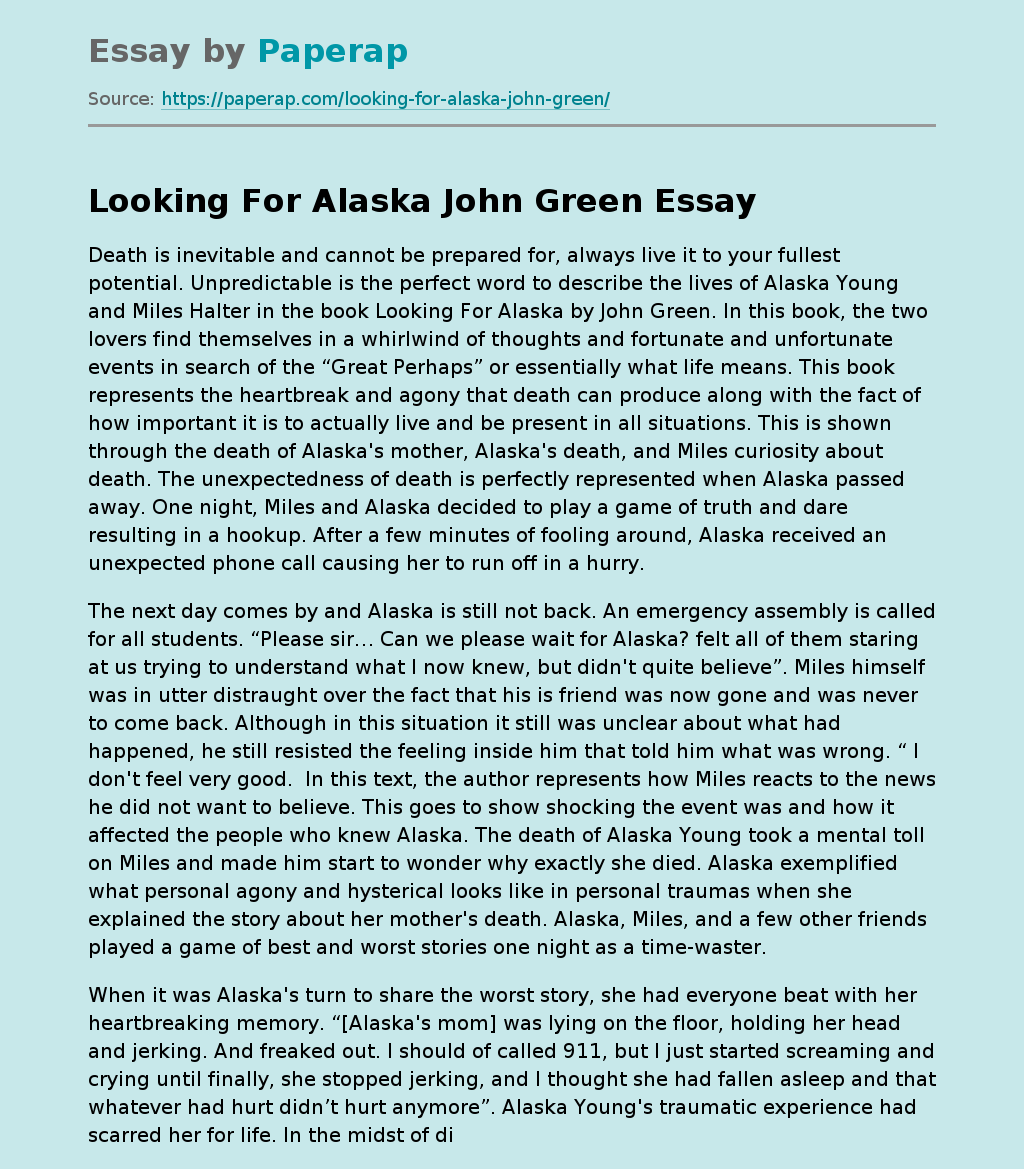Looking For Alaska John Green
Death is inevitable and cannot be prepared for, always live it to your fullest potential. Unpredictable is the perfect word to describe the lives of Alaska Young and Miles Halter in the book Looking For Alaska by John Green. In this book, the two lovers find themselves in a whirlwind of thoughts and fortunate and unfortunate events in search of the “Great Perhaps” or essentially what life means. This book represents the heartbreak and agony that death can produce along with the fact of how important it is to actually live and be present in all situations.
This is shown through the death of Alaska’s mother, Alaska’s death, and Miles curiosity about death. The unexpectedness of death is perfectly represented when Alaska passed away. One night, Miles and Alaska decided to play a game of truth and dare resulting in a hookup. After a few minutes of fooling around, Alaska received an unexpected phone call causing her to run off in a hurry.
The next day comes by and Alaska is still not back. An emergency assembly is called for all students. “Please sir… Can we please wait for Alaska? felt all of them staring at us trying to understand what I now knew, but didn’t quite believe”. Miles himself was in utter distraught over the fact that his is friend was now gone and was never to come back. Although in this situation it still was unclear about what had happened, he still resisted the feeling inside him that told him what was wrong.
“ I don’t feel very good. In this text, the author represents how Miles reacts to the news he did not want to believe. This goes to show shocking the event was and how it affected the people who knew Alaska. The death of Alaska Young took a mental toll on Miles and made him start to wonder why exactly she died. Alaska exemplified what personal agony and hysterical looks like in personal traumas when she explained the story about her mother’s death. Alaska, Miles, and a few other friends played a game of best and worst stories one night as a time-waster.
When it was Alaska’s turn to share the worst story, she had everyone beat with her heartbreaking memory. “[Alaska’s mom] was lying on the floor, holding her head and jerking. And freaked out. I should of called 911, but I just started screaming and crying until finally, she stopped jerking, and I thought she had fallen asleep and that whatever had hurt didn’t hurt anymore”. Alaska Young’s traumatic experience had scarred her for life. In the midst of disaster, she explains how she didn’t know what to do or how to react in the situation. This illustrates how death can happen so suddenly, and cannot be prepared for. Alaska’s mother’s death is a perfect demonstration of the emotional rollercoaster you can endure from the expiry of a family member or close friend. Another way death is shown to be inevitable is through Miles’s obsession with last words and death itself. Last words also tell you how living your life is important, Throughout the course of the book, Miles talks a lot about the last words.
He is very much obsessed with the fact that they tell a faint story of a person’s life. “But a lot of times, people die how they live. And so last words tell me a lot about who people were, and why they became the sort of people biographies get written about”. The last words show that death is bound to happen no matter what. They also are a great indication of how a person lived and what their character was like. “That’s the mystery, isn’t it? Is the labyrinth living or dying? Which is he trying to escape–the world or the end of it?”. This quote represents how mysterious death is and essentially explains why miles has such an obsession with it. No matter what, death is bound to happen and it’s up to you to decide how you want to fulfill and look at it. This book represents what it means to live. In the end, Miles realizes that Alaska exemplifies the “Great Perhaps” which really means to come to find peace with yourself. After the death of Alaska Young, Miles finds himself “looking for Alaska”–or peace in his own life. So it’s up to you, are you living your life half-full, or half-empty?
Looking For Alaska John Green. (2021, Dec 13). Retrieved from https://paperap.com/looking-for-alaska-john-green/

